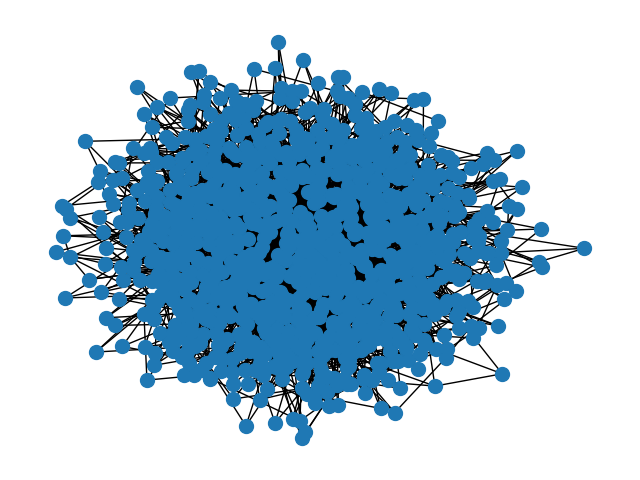Note
Go to the end to download the full example code.
Parallel Betweenness#
Example of parallel implementation of betweenness centrality using the multiprocessing module from Python Standard Library.
The function betweenness centrality accepts a bunch of nodes and computes the contribution of those nodes to the betweenness centrality of the whole network. Here we divide the network in chunks of nodes and we compute their contribution to the betweenness centrality of the whole network.
Note: The example output below may show that the non-parallel implementation is faster. This is a limitation of our CI/CD pipeline.
Depending on your setup, you will likely observe a speedup.

Computing betweenness centrality for:
Graph with 1000 nodes and 2991 edges
Parallel version
Time: 1.1953 seconds
Betweenness centrality for node 0: 0.17382
Non-Parallel version
Time: 2.2711 seconds
Betweenness centrality for node 0: 0.17382
from multiprocessing import Pool
import time
import itertools
import matplotlib.pyplot as plt
import networkx as nx
def chunks(l, n):
"""Divide a list of nodes `l` in `n` chunks"""
l_c = iter(l)
while 1:
x = tuple(itertools.islice(l_c, n))
if not x:
return
yield x
def betweenness_centrality_parallel(G, processes=None):
"""Parallel betweenness centrality function"""
p = Pool(processes=processes)
node_divisor = len(p._pool) * 4
node_chunks = list(chunks(G.nodes(), G.order() // node_divisor))
num_chunks = len(node_chunks)
bt_sc = p.starmap(
nx.betweenness_centrality_subset,
zip(
[G] * num_chunks,
node_chunks,
[list(G)] * num_chunks,
[True] * num_chunks,
[None] * num_chunks,
),
)
# Reduce the partial solutions
bt_c = bt_sc[0]
for bt in bt_sc[1:]:
for n in bt:
bt_c[n] += bt[n]
return bt_c
G = nx.barabasi_albert_graph(1000, 3)
print("Computing betweenness centrality for:")
print(G)
print("\tParallel version")
start = time.time()
bt = betweenness_centrality_parallel(G, processes=2)
print(f"\t\tTime: {(time.time() - start):.4F} seconds")
print(f"\t\tBetweenness centrality for node 0: {bt[0]:.5f}")
print("\tNon-Parallel version")
start = time.time()
bt = nx.betweenness_centrality(G)
print(f"\t\tTime: {(time.time() - start):.4F} seconds")
print(f"\t\tBetweenness centrality for node 0: {bt[0]:.5f}")
nx.draw(G, node_size=100)
plt.show()
Total running time of the script: (0 minutes 6.552 seconds)